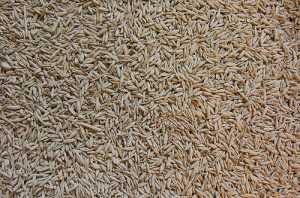50% Off First Application¹
Call 1-855-940-1479
and connect with a TruGreen consultant
What Kind of Grass Seed is Best for Your Lawn?
There are many types of grass seed available to homeowners, but when deciding on the best type of seed for your lawn there are many factors that must be taken into consideration. Unfortunately, picking out the best grass seed for your lawn isn’t as easy as going to to the store and walking
out with the seed that produces the most aesthetically pleasing grass. Water needs, shade and sunlight needs, texture and even the amount of traffic in your lawn are all important factors that should be considering when selecting the best seed for your lawn.
Water needs
Some grasses require very sporadic waterings and are capable of surviving in drought-like conditions, while others will die if just a few days pass without of regular irrigation. It is important that you select a seed that can survive based on the rainfall conditions in your area, as well as the time it takes to recreate these conditions using an irrigation system on clear days.
Remember not to use your sprinkler system on days where it may rain, doing so could lead to drastic overwatering that could damage your lawn. Also be conscious of the time of day at which you water your lawn, the best time to do so is in the early morning hours so that your lawn has all day to dry in the sunlight. Watering later in the day could result in a soggy yard.

Shade and sunlight
When attempting to find the best type of grass seed for your lawn the amount of sunlight that’s present each day is a very important factor. Some lawns see large amounts of direct sunlight throughout the day, while others are in mostly shaded areas. Monitor your lawn prior to researching seed types in order to determine the best one for your lawn. Selecting a grass seed for the wrong type of sunlight will lead to an unsuccessful lawn.
If there are areas of your yard that receive a lot of sunlight while others are almost entirely shaded, you should select a variety of seed that is flexible in it’s sunlight needs. Alternatively you could plant different grasses that have a similar appearance throughout your yard, or create a seed blend by combining two types of seed.
Texture and traffic
Grass texture varies greatly from one variety of grass seed to the next. There are grass varieties that are better for low-traffic lawns as well as others that tend to thrive in lawns that experience high amounts of traffic. If you have children or pets that spend a good amount of time in the yard, you’ll want to select a variety that can withstand heavy traffic patterns. In lawns that aren’t used as frequently and feature walkways that cut down on direct traffic you have more flexibility in the grass variety that you select.
Grass selector
Use the chart below to determine the best grass for your lawn’s individual conditions. Here you’ll find some of the most commonly used types of grass seed, but you may find that none of these are right for your lawn. If you don’t find the right fit here, it doesn’t mean that grass cannot thrive in your lawn: You may just need to spend some time researching less common varieties of grass that are better suited for your needs.
| Type of Seed | Water Required | Sunlight Needs | Texture | Traffic |
| Bermuda | Average | Direct | Fine / Medium | High |
| Buffalo | Low | Direct | Fine | High |
| Centipede | Medium | Average | Coarse | Low |
| Fescue | Low | Average | Coarse | Medium |
| Kentucky Blue Grass | High | Average | Fine / Medium | Medium |
| Perennial Ryegrass | Medium | Average | Medium / Coarse | Medium – High |
If these types of grass seed do not meet your needs there are other common grass varieties that you may want to look into. These include (but aren’t limited to) Bentgrass, Bahia, St. Augustine and Zoysia.

TruGreen will gladly visit your property as often as needed between scheduled visits to make any necessary adjustments and to ensure your satisfaction.
Getting Started with TruGreen
- Call or fill out the form above to reach a lawn care specialist.
- Know the square footage of your yard, as well as any specific areas of concern.
- With the help of your specialist, create a customized lawn care plan that meets your lawn’s needs.
- Schedule your Healthy Lawn Analysis2 to start your service.
